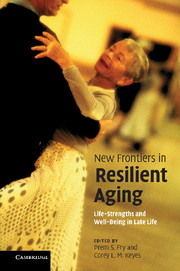Book contents
- Frontmatter
- Contents
- Figures
- Notes on contributors
- Foreword
- Acknowledgments
- Introduction
- 1 Sources of human life-strengths, resilience, and health
- 2 Growth is not just for the young: growth narratives, eudaimonic resilience, and the aging self
- 3 Physical resilience and aging:
- 4 You can teach an old dog new tricks:
- 5 Resilience in the face of cognitive aging:
- 6 Why do some people thrive while others succumb to disease and stagnation?
- 7 Psychosocial resources as predictors of resilience and healthy longevity of older widows
- 8 Resilience and longevity:
- 9 The socioemotional basis of resilience in later life
- 10 Emotional resilience and beyond:
- 11 Risk, resilience, and life-course fit:
- 12 Resilience in mobility in the context of chronic disease and aging:
- 13 Positive aging:
- Index
- References
13 - Positive aging:
resilience and reconstruction
Published online by Cambridge University Press: 06 December 2010
- Frontmatter
- Contents
- Figures
- Notes on contributors
- Foreword
- Acknowledgments
- Introduction
- 1 Sources of human life-strengths, resilience, and health
- 2 Growth is not just for the young: growth narratives, eudaimonic resilience, and the aging self
- 3 Physical resilience and aging:
- 4 You can teach an old dog new tricks:
- 5 Resilience in the face of cognitive aging:
- 6 Why do some people thrive while others succumb to disease and stagnation?
- 7 Psychosocial resources as predictors of resilience and healthy longevity of older widows
- 8 Resilience and longevity:
- 9 The socioemotional basis of resilience in later life
- 10 Emotional resilience and beyond:
- 11 Risk, resilience, and life-course fit:
- 12 Resilience in mobility in the context of chronic disease and aging:
- 13 Positive aging:
- Index
- References
Summary
Abstract
From a social constructionist perspective, conceptions of aging emerge from participation in relationships. Thus, there is reason to counter the Western stereotype of aging as decline with a more robust and positive vision. In the same way, resilience in everyday life may be achieved by engaging creatively and collaboratively in coordinating the flow of circumstances and interpretations making up daily life. We illustrate the potentials of resilience in terms of collaborative attempts to generate positive reconstructions of what are often defined as debilitating circumstances: reduced income, diminished attractiveness in physical appearance, declining physical and mental abilities, physical handicaps, the “empty nest,” the loss of loved ones and approaching death. As we propose, sustaining a resilient orientation requires continuous improvization, as one's life conditions continue to change. By drawing on the resources accumulated over a lifetime, and collaborating with one's contemporaries, culturally defined losses may be reconstructed and a positive confluence re-established.
As we look back at our lives, we both agree that when we were in our twenties and thirties, we had not looked forward to “growing old.” We never wanted to be identified as “old folks” and we did not look forward to “retiring.” Later we viewed with some distress the emergence of wrinkles and gray hair, and we hoped that every forgotten name was not a sign of dementia. It was not so much the signaling of oncoming death that was important in our age anxiety.
- Type
- Chapter
- Information
- New Frontiers in Resilient AgingLife-Strengths and Well-Being in Late Life, pp. 340 - 356Publisher: Cambridge University PressPrint publication year: 2010
References
- 9
- Cited by

